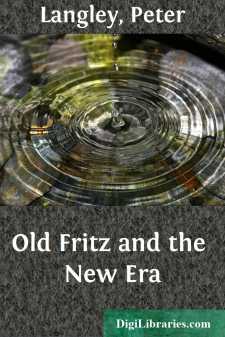Categories
- Antiques & Collectibles 13
- Architecture 36
- Art 48
- Bibles 22
- Biography & Autobiography 813
- Body, Mind & Spirit 142
- Business & Economics 28
- Children's Books 17
- Children's Fiction 14
- Computers 4
- Cooking 94
- Crafts & Hobbies 4
- Drama 346
- Education 46
- Family & Relationships 57
- Fiction 11829
- Games 19
- Gardening 17
- Health & Fitness 34
- History 1377
- House & Home 1
- Humor 147
- Juvenile Fiction 1873
- Juvenile Nonfiction 202
- Language Arts & Disciplines 88
- Law 16
- Literary Collections 686
- Literary Criticism 179
- Mathematics 13
- Medical 41
- Music 40
- Nature 179
- Non-Classifiable 1768
- Performing Arts 7
- Periodicals 1453
- Philosophy 64
- Photography 2
- Poetry 896
- Political Science 203
- Psychology 42
- Reference 154
- Religion 513
- Science 126
- Self-Help 84
- Social Science 81
- Sports & Recreation 34
- Study Aids 3
- Technology & Engineering 59
- Transportation 23
- Travel 463
- True Crime 29
Old Fritz and the New Era
by: Peter Langley
Description:
Excerpt
FOREWORD
I would merely say a few words in justification of the Historical Romance, in its relation to history. Any one, with no preceding profound study of history, who takes a few well-known historical facts as a foundation for an airy castle of romantic invention and fantastic adventure, may easily write an Historical Romance; for him history is only the nude manikin which he clothes and adorns according to his own taste, and to which he gives the place and position most agreeable to himself. But only the writer who is in earnest with respect to historical truth, who is not impelled by levity or conceited presumption, is justified in attempting this species of composition; thoroughly impressed with the greatness of his undertaking, he will with modest humility constantly remember that he has proposed to himself a great and sublime work which, however, it will be difficult if not impossible for him wholly and completely to accomplish.
But what is this great, this sublime end, which the Historical Romance writer proposes to attain? It is this: to illustrate history, to popularize it; to bring forth from the silent studio of the scholar and to expose in the public market of life, for the common good, the great men and great deeds embalmed in history, and of which only the studious have hitherto enjoyed the monopoly. Thus, at least, have I considered the vocation I have chosen, not vainly or inconsiderately, but with a profound conviction of the greatness of my undertaking, and with a depressing consciousness that my power and acquirements may prove inadequate for the attainment of my proposed end.
But I am also fully conscious of what was and still is my greatest desire: to give an agreeable and popular form to our national history, which may attract the attention and affections of our people, which may open their understandings to the tendencies of political movements, and connect the facts of history with the events of actual life.
The severe historian has to do but with accomplished facts; he can only record and describe, with the strictest regard to truth, that which has outwardly occurred. He describes the battles of peoples, the struggles of nations, the great deeds of heroes, the actions of princes—in short, he gives the accomplished facts. To investigate and explain the secret motives, the hidden causes of these facts, to present them in connection with all that impelled to them, this is the task of Historical Romance.
The historian presents to you the outward face, the external form of history; Historical Romance would show you the heart of history, and thus bring near to your heart what, else, would stand so far off. To enable him to do this, the writer of an Historical Romance must, indeed, make severe and various studies. He must devote his whole mind and soul to the epoch he would illustrate, he must live in it and feel with it. He must so familiarize himself with all the details, as in a manner to become a child of that epoch; for he can present a really living image of only that which is living in himself....


